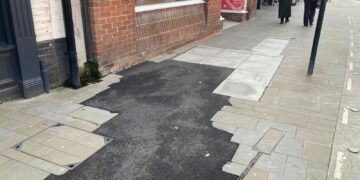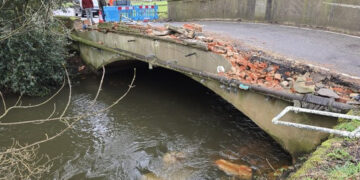Is a protest a waste of time, when the thing you’re protesting against is going to happen anyway?
Danielle Pearson’s play “Camp Albion” explores the much-publicised objections to the Newbury Bypass which saw many camp out amid the contested trees from 1995 – 1996.
To many, the planned bypass was a purely profit-driven move which would destroy 10,000 trees – a move which could’ve taken another, less-destructive route. Their objections translated into using squatters rights and tree-sitting to delay the work.
To others, it was a necessary development that would relieve congestion around Newbury, thereby reducing congestion and pollution. Some took the view that the protestors were delaying the inevitable, causing havoc to the work crews while dressed as wizards.

The play (expertly directed by Georgie Straight) does a brilliant job of capturing both sides of the argument. Cassie (Hannah Brown) is a a journalist student who’s returned home for the holidays. Fascinated by the furore over the protest, she starts interviewing both the locals and the key players to understand their take on the situation. Their views are presented without judgement, allowing the audience to understand the debate without feeling as if they’re being forced to take a side.
It isn’t long before she meets Dylan (Joe Swift), one of the protestors who lives in the makeshift Camp Albion. While others are using the protest as a chance to break free from their normal lives, or indulge in a spot of druidism, he takes the whole matter seriously, and fears that the press’s coverage simply paints the protestors as cranks.
Those fears are amplified by Foxglove Sue (Kate Russell-Smith), a long-time protestor who views the budding journalist with suspicion. She provides perhaps the best glimpse into the protestor’s mindset – in one especially moving scene, she befriends one of the construction workers after understanding the hellishly underpaid and grim working conditions he’s subjected to.

As a bond slowly forms between the three characters, Cassie is drawn further into Camp Albion and begins to question not just the development, but her own lifestyle…but where will this leave her when the bulldozers begin closing in?
Watching this play in The Watermill Theatre, so close to the contested land, really brings home the reality of the situation. The surroundings are so beautiful, and so peaceful, the site of treasured memories to so many people who will have precious memories of the times they spent there with parents, lovers and children.
You can’t help but sympathise with the protestor’s argument, made all the more affecting by the fact that despite the harsh conditions of their camp (the action here predominantly taking place in the heart of winter) they still manage to make it feel like a home. Expert set design and lighting from the technical crew, and the cast’s fantastic musical talents, really do make you feel like you’re staying there with them.

But were their efforts worth it in the end? The bypass was built in the end, and the camps are now long gone. But did the protestors leave a different sort of legacy? Are we now more aware of the environment than we might otherwise have been?
You’ll have to watch the play yourself and decide. “Camp Albion” runs at The Watermill Theatre from 6th – 16th July, following a tour of village halls which took place across the 15th June – 2nd July. Tickets are available at https://www.watermill.org.uk















































